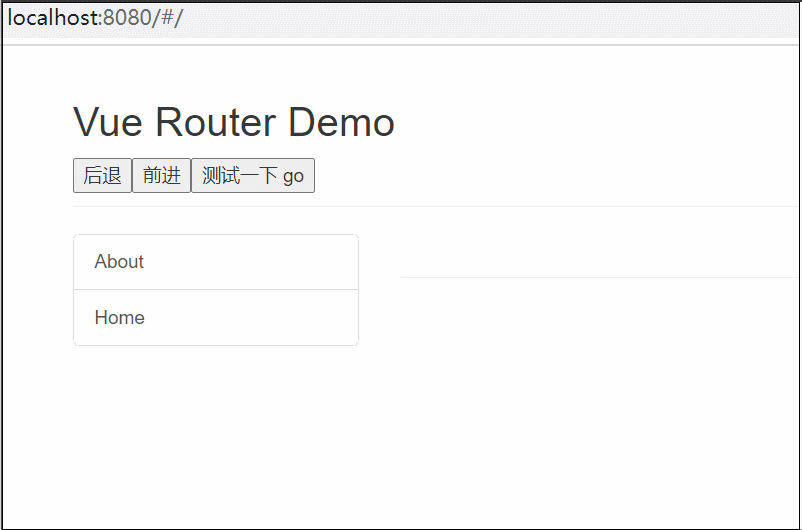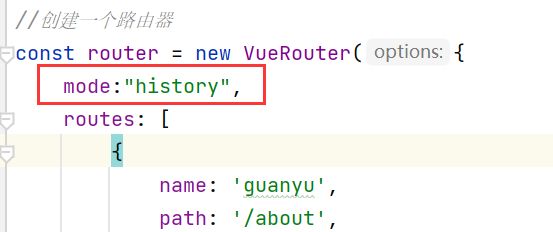Vue 路由守卫
文章目录
- 路由前置-路由守卫
- 全局后置-路由守卫
- 独享路由守卫
- 组件内路由守卫
- 路由器的两种工作模式
1.路由作用:对路由进行权限控制
2.路由分类:全局守卫、独享守卫、组件内守卫
路由前置-路由守卫
现在的需求是访问 News 和 Message 时验证 localstorage,如果 school 的值是 三里屯小学 才能正常访问,否则提示没有权限:

现在增加 localstorage:

现在就能正常访问了

修改 index.js ,给每个路由增加 name 属性,然后增加前置路由守卫
......
//创建一个路由器
const router = new VueRouter({
routes: [
{
name: 'guanyu',
path: '/about',
component: About
},
{
name: 'zhuye',
path: '/home',
component: Home,
children: [
{
path: 'news',
component: News
},
{
name: 'xiaoxi',
path: 'message',
component: Message,
children: [
{
name: 'xiangqing',
path: 'detail',
component: Detail,
props({query: {id, title}}) {
return {id, title}
}
}
]
}
]
},
]
})
//全局前置路由守卫
//初始化的时候调用、每次切换之前调用
router.beforeEach((to, from, next) => {
console.log(to, from);
if (to.path === '/home/news' || to.name ==='xiaoxi') {
if (localStorage.getItem("school") === "三里屯小学") {
next()
}else {
alert("无权限")
}
}else{
next()
}
})
export default router;
可以看到我们在前置路由守卫中判断了当路径是 news 或 name =‘xiaoxi’ 时进行权限的校验,如果判断条件太多,这个 if 语句就会很繁琐,我们可以在配置路由信息时使用 meta
......
const router = new VueRouter({
routes: [
{......},
{
......
children: [
{
path: 'news',
......
meta:{
isAuth:true
}
},
{
name: 'xiaoxi',
......
meta:{
isAuth:true
},
children: [......]
}
]
},
]
})
//全局前置路由守卫
//初始化的时候调用、每次切换之前调用
router.beforeEach((to, from, next) => {
if (to.meta.isAuth) {
......
}else{
......
}
})
export default router;
全局后置-路由守卫
现在的需求是点击链接,页签的标题也进行修改

首先需要给每个路由设置 meta 增加一个字段标识标题,然后使用后置路由守卫 afterEach 来修改
const router = new VueRouter({
routes: [
{
name: 'guanyu',
......
meta: {title: '关于'}
},
{
name: 'zhuye',
......
meta: {title: '主页'},
children: [
{
path: 'news',
component: News,
meta: {
isAuth: true,
title: '新闻'
}
},
{
name: 'xiaoxi',
path: 'message',
component: Message,
meta: {
isAuth: true,
title: '消息'
},
children: [
{
name: 'xiangqing',
path: 'detail',
component: Detail,
meta: {
title: '详情'
},
......
}
]
}
]
},
]
})
......
//全局后置路由
//初始化的时候被调用、每次路由切换之后被调用
router.afterEach((to, from) => {
console.log(to, from);
document.title = to.meta.title || ""
})
export default router;
独享路由守卫
独享路由守卫即给路由单独设置的路由守卫,使用 beforeEnter,例如我们单独给消息设置一下当 localstorage 中 school 为三里屯小学时才能查看,否则就提示,功能和之前写的一样
{
name: 'xiaoxi',
path: 'message',
component: Message,
meta: {
isAuth: true,
title: '消息'
},
beforeEnter: ((to, from, next) => {
if (to.meta.isAuth) {
if (localStorage.getItem("school") === "三里屯小学") {
next()
} else {
alert("无权限")
}
} else {
next()
}
}
),
children: []
}
组件内路由守卫
给组件内单独设置路由守卫,例如修改 About
<template>
<h2>我是About的内容</h2>
</template>
<script>
export default {
name: "About",
//通过路由规则,进入该组件时被调用
beforeRouteEnter(to,from,next){
console.log("About beforeRouteEnter",to,from);
//一些组件内特有的
},
//通过路由规则,离开该组件时被调用
beforeRouteLeave(to,from,next){
console.log("About beforeRouteLeave",to,from);
//一些组件内特有的
next()
}
}
</script>
路由器的两种工作模式
1、对于一个url来说,什么是hash值?
#及其后面的内容就是hash值
2、hash值不会包含在HTTP请求中,即: hash值不会带给服务器
3.、hash模式:
①地址中永远带着 # 号,不美观。
②若以后将地址通过第三方手机app分享,若 app 校验严格,则地址会被标记为不合法
③兼容性较好
4、history 模式:
①地址干净,美观
②兼容性和 hash 模式相比略差
③应用部署上线时需要后端人员支持,解决刷新页面服务端404的问题
执行npm run build进行打包,目录下会生成一个 dist 文件夹,部署到线上

修改路由的工作模式,修改 mode,值为history或hash

这里不做过多讲解,可以修改看下路径的区别,或用 express 部署一个本地的服务器把代码部署一下看看效果